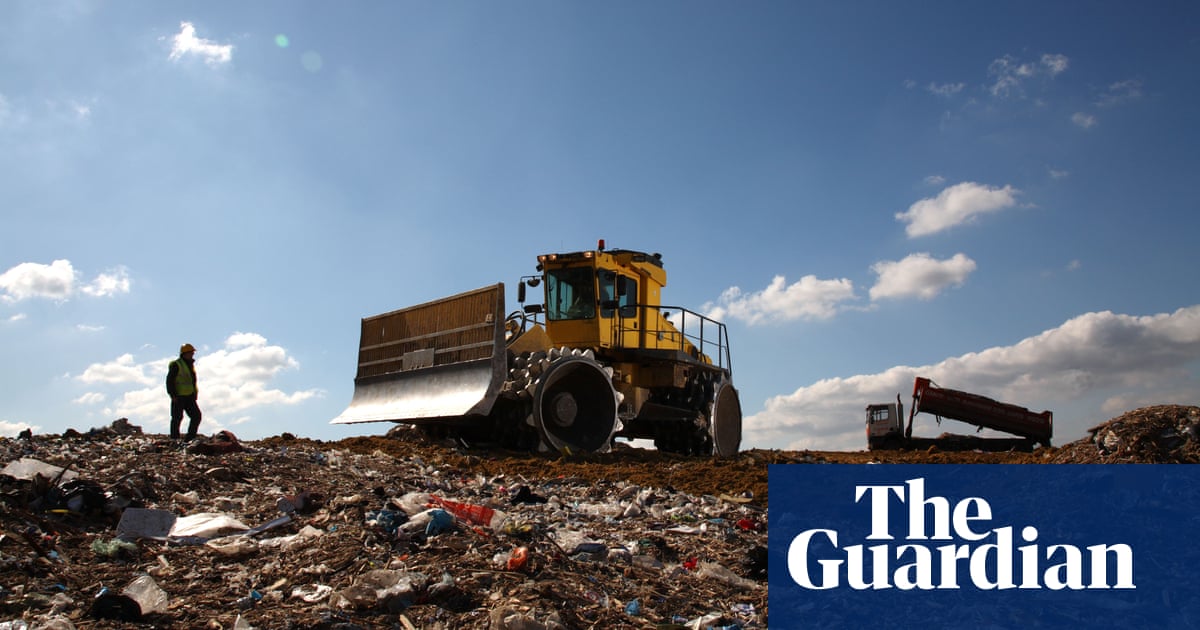Sewage sludge spread on farmland is contaminating soils, water and potentially the food chain with “forever chemicals”, and whistleblowers from the Environment Agency say the systems in place to prevent such pollution are “not fit for purpose”.
Watershed Investigations and the Guardian obtained samples of treated sewage sludge destined to be spread on land from five different catchments, and found levels of PFAS (per- and polyfluoroalkyl substances) forever chemicals that would not be considered safe on allotments, as well as levels of flame-retardant chemicals described by experts as “exceptionally high”.
PFAS and flame retardants are known as forever chemicals because they take thousands of years to break down in the environment, if they break down at all. Some have been linked to serious diseases including cancers, and they have been found widely polluting the environment, wildlife and people’s blood. The chemicals are found in a wide range of consumer products and industrial processes.
There are no statutory thresholds for forever chemicals in sewage sludge in the UK, unlike some EU member states, but all the samples exceeded what would be considered acceptable on allotments for a banned PFAS called PFOS.
Dr David Megson, a forensic environmental scientist from Manchester Metropolitan University, said the “concentration of PFAS in the sludge samples poses a cause of concern. Concentrations of PFOS in all samples were greater than the recommended limit for an allotments site (2.7μg/kg). Uptake of PFAS in fruit and vegetables is poorly understood, but recent research has concluded that consumption of crops is a significant and underappreciated pathway for human exposure to PFAS.”
Prof Hans Peter Arp, an environmental chemist at the Norwegian University of Science and Technology, said he found the concentrations of flame retardants, used to coat materials to prevent them catching fire, “exceptionally high … Norway would consider 500μg/kg as contaminated, but these sludges range from 8,000 to 12,000μg/kg. I suspect the cause is fire-proof textile and/or textile manufacturing.”

Huge volumes of sewage sludge, also known as biosolids but which is essentially human excrement and industrial waste, are spread on UK fields every year. It is regulated by the Environment Agency and treated by the water companies before being sold to farmers, but many substances are not removed by the processes. Analysis of official figures by Watershed and the Guardian shows that the total amount of sludge produced for spreading has increased from 790,923 tonnes to 819,001 tonnes between 2012 and 2023. In that time, the amount of land it is spread on has increased by 12% from 135,637 hectares to 151,921 hectares, with most of it spread on agricultural land.
The Environment Agency is supposed to police the sludge but in practice this is not happening, whistleblowers from the agency told Watershed and the Guardian. Large volumes of industrial waste enter sewage treatment works every day, as well as human waste, either via the sewerage system or by tanker. Much of the waste tankered in contains leachate – dirty liquid created by landfills – which contains a cocktail of chemicals from a range of industries.
The whistleblowers say they do not believe the checks made by the water companies to ensure they can treat all the substances within the wastes are always robust and reliable.
One Environment Agency insider who asked not to be named said: “What’s going on at the moment is going to be adding potentially significant amounts of contaminants into the wastewater treatment system and therefore what comes out the other end in the final effluent, and what comes out in the sludge.”
“It’s a very lucrative area,” said the insider. Water companies charge industry to dispose of waste at their works, so there is a financial incentive to accept it. They said the water companies give the Environment Agency “assurances that they have a process in place for preassessment of the wastes but I am not in the least bit convinced that that is a very robust system … trade effluent and consenting is pretty much a self-policing system.
“An awful lot of tankered effluents are landfill leachates [which] are probably our greatest concern. You can imagine the number of substances, including PFAS, in them. They’re not going to be transformed or destroyed by the wastewater treatment process, they’re going to come out in the effluent or they’re going to end up in sludge.”
But disposing of leachates at sewage works is cheap for those generating the waste, says the insider, which means other options are not being explored. Water companies sell sludge to farmers but the insider says the agency does not know where the sludge is spread. “It’s completely invisible to us,” said the insider. However the Environment Agency contends that it does know because it reviews water company registers.
They say the agency has been pushing for reform of the system for years but that it has been blocked by the Department for Environment, Food and Rural Affairs (Defra).
The water industry wants to see the back of PFAS. A spokesperson for trade body Water UK said: “We want to see PFAS banned and the development of a national plan to remove it from the environment which should be paid for by manufacturers. In the meantime, water companies are exploring alternatives to spreading sludge to land on a precautionary basis.”
In March 2020 the Environment Agency published a strategy for safe and sustainable sludge use, but its implementation date kept slipping and another Environment Agency insider says little has been done in practice.

“The more industrial waste that is put into sewers for the profit of water companies, the more PFAS contaminated water will discharge from outfalls, and the more PFAS contaminated sludge will end up on agricultural land, and so in the food chain and local watercourses,” they said. “The same goes for all other discharge permits as none have PFAS as a limit or any sampling that requires it as a determinant. Nothing has changed over the last few years and there is nothing to suggest it will.
“The sewage sludge circle is highly profitable for all the parties involved. Heavy industry saves money by disposing [of] toxic waste down sewers, water companies are able to get rid of contaminated sludge on the cheap, and agriculture benefits from free fertiliser.”
PFAS in sludge has created enormous problems for farmers in the US. In 2016, in Maine, high levels of PFAS were detected in milk from a dairy farm and investigations revealed that the source was sludge applied to the farmland as fertiliser. About 78 farms across Maine have been identified with PFAS contamination and drinking water sources have been polluted.
Maine banned land application of PFAS-contaminated sludge and compost derived from sludge, a fund was established to support affected farmers, and the Portland Water District has filed a lawsuit against manufacturers of PFAS, seeking to recover costs associated with monitoring and treating contaminated wastewater.
Royal Society of Chemistry policy adviser Stephanie Metzger said: “Sludge spreading is an emerging issue of concern, and we need to do comprehensive monitoring in order to understand if contaminants such as PFAS are present, and if so what kinds and how much. It also represents a potential new contamination pathway that may result in PFAS contamination in previously unaffected areas.”
Defra said: “We recognise the damage agricultural runoff can cause, and we need to see the safe and sustainable use of sludge in agriculture to help clean up our waterways and promote healthy soil. As well as working closely with the Environment Agency to assess the current legal framework, we have also commissioned an independent review of the water sector to shape further legislation that will transform how our water system works and clean up rivers, lakes and seas for good.”
An Environment Agency spokesperson said: “Effective regulation in the safety of spreading sludge on land is vital and we are clear that sludge can only be used if it does not impair the quality of soil or surface and groundwater … we are undertaking a multi-year programme to better understand sources of PFAS pollution in England.”

.png) 3 months ago
32
3 months ago
32













































